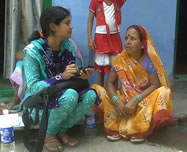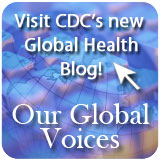CDC and Noncommunicable Diseases Around the World

In India, a resident is interviewed as part of the Global Adult Tobacco Survey (GATS) data collection.
Global health is facing a dramatic change. For the first time in human history, more people live in urban than rural areas. More people are overweight than underweight around the world. Noncommunicable diseases (NCDs) such as heart disease and stroke, cancer, diabetes, and chronic lung disease kill more people globally than infectious diseases. Learn more about the threat of NCDs >
February 4 is World Cancer Day!
On February 4, CDC joins people, organizations, and government agencies around the world in supporting World Cancer Day. Each year, 7.6 million people die from cancer worldwide; many of these deaths can be prevented. Learn more >
Highlights of CDC's Global NCD Programs
Field Epidemiology Training Program
For over 30 years, CDC has supported capacity-building via FETP in low- and middle-income countries. Traditionally designed to help countries respond to infectious disease threats, this flagship program is expanding to include training on noncommunicable diseases.
Tobacco Control
Tobacco use is the leading cause of preventable deaths globally. Approximately 5.4 million people die each year from tobacco use. That figure is expected to rise to more than 8 million deaths a year by 2030 and the vast majority of deaths will occur in low- to middle-income countries.
Cervical Cancer
Worldwide, cervical cancer affects half a million women and kills a quarter million women each year. Over 85% of cervical cancer cases and deaths occur in developing countries. Virtually all cases are linked to persistent infection with human papillomavirus (HPV).
Promoting Physical Activity
In collaboration with partners, CDC has funded the development of the Guide for Useful Interventions for Physical Activity in Brazil and Latin America, known as Project GUIA. Project GUIA addresses physical inactivity and obesity by identifying, testing, and disseminating potentially effective interventions.
Clean Cookstoves
Cooking and heating with solid fuels indoors pollutes the air and increases the risk of illness for early 3 billion people worldwide. This type of indoor air pollution is the leading cause of lung cancer and chronic lung disease among nonsmoking women in the world's poorest communities.
Motorcycle Helmets
The Global Helmet Vaccine Initiative works to expand the successful Vietnam Helmet Vaccine Initiative Program to other nations. Cambodia and Uganda are the first sites to develop and implement helmet promotion programs and to influence local policy makers to pass and enforce helmet laws.
Assessing Student Health Behavior
Developing countries often lack the resources and expertise to collect scientifically sound data on the risk behaviors and protective factors of their adolescent population. CDC and WHO developed the Global School-based Student Health Survey (GSHS).
Hypertension and Salt
Cardiovascular disease is the leading cause of death in China and was responsible for 3.5 million deaths in 2008 alone. High blood pressure (hypertension) is a major contributor. Too much sodium in the diet is a key risk factor for hypertension. Daily sodium intake in China is well above the WHO recommended limit.
Get email updates
To receive email updates about the Global Health site, enter your email address:



